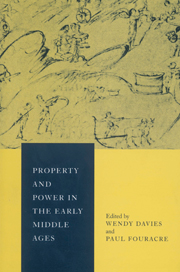Book contents
- Frontmatter
- Contents
- List of maps
- Preface
- List of abbreviations
- Introduction
- 1 The ideology of sharing: apostolic community and ecclesiastical property in the early middle ages
- 2 Teutsind, Witlaic and the history of Merovingian precaria
- 3 Eternal light and earthly needs: practical aspects of the development of Frankish immunities
- 4 The wary widow
- 5 Lordship and justice in the early English kingdom: Oswaldslow revisited
- 6 Adding insult to injury: power, property and immunities in early medieval Wales
- 7 Property transactions and social relations between rulers, bishops and nobles in early eleventh-century Saxony: the evidence of the Vita Meinwerci
- 8 Monastic exemptions in tenth- and eleventh-century Byzantium
- 9 Property ownership and signorial power in twelfth-century Tuscany
- 10 Conclusion: property and power in early medieval Europe
- Glossary
- List of works cited
- Index
3 - Eternal light and earthly needs: practical aspects of the development of Frankish immunities
Published online by Cambridge University Press: 25 January 2010
- Frontmatter
- Contents
- List of maps
- Preface
- List of abbreviations
- Introduction
- 1 The ideology of sharing: apostolic community and ecclesiastical property in the early middle ages
- 2 Teutsind, Witlaic and the history of Merovingian precaria
- 3 Eternal light and earthly needs: practical aspects of the development of Frankish immunities
- 4 The wary widow
- 5 Lordship and justice in the early English kingdom: Oswaldslow revisited
- 6 Adding insult to injury: power, property and immunities in early medieval Wales
- 7 Property transactions and social relations between rulers, bishops and nobles in early eleventh-century Saxony: the evidence of the Vita Meinwerci
- 8 Monastic exemptions in tenth- and eleventh-century Byzantium
- 9 Property ownership and signorial power in twelfth-century Tuscany
- 10 Conclusion: property and power in early medieval Europe
- Glossary
- List of works cited
- Index
Summary
A concern voiced in many of the studies in this volume is the extent to which concepts of immunity are bound up with questions of property and power; hence the need to clear the ground around this subject in an introductory note. As we have seen, discussions about the medieval immunity usually treat the subject as an essentially Frankish phenomenon. In order to say more about the nature and early development of immunities, and to explain more fully some of the issues raised in the introduction to the subject, it is sensible to begin with their origins in seventh-century Francia, and to try to understand both the purposes they originally served and the historical context in which they developed. It is upon this area that the present chapter focusses, and after a few preliminary remarks about current debates in this subject area, it will look at the early history of royal immunities before attempting to assess their historical significance from a new angle.
That Frankish immunities were somehow very important in the development of medieval Europe is a common assumption in outline histories of medieval society. Such overviews tend to be dialectical, that is, they look for the seeds of later developments in a period of history which is seen as transitional. In Francia, this is the Merovingian period (481–751) which ‘comes between’ antiquity and the middle ages proper, and the seed here is the immunity. One can see why royal immunities might be thus regarded: by granting rights of immunity to landowners from the seventh century onwards, rulers apparently conferred upon them those judicial rights which gave them complete power over their property.
- Type
- Chapter
- Information
- Property and Power in the Early Middle Ages , pp. 53 - 81Publisher: Cambridge University PressPrint publication year: 1995
- 22
- Cited by



